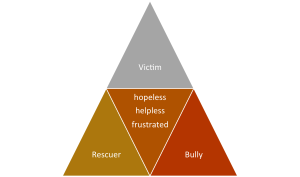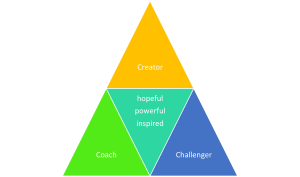Are you a victim or a victor? The choice is yours.
As a student of English and life I notice how easy it is to break down our emotional states into two triangles that my therapist taught me this year – “The Drama Triangle” and “The Empowerment Dynamic Triangle.”
Let me start with The Drama Triangle, as that was the one that deeply resonated with me first; I think this was the case because I was trapped in it and needed to understand it to move out of it to The Empowerment Dynamic Triangle.
The drama triangle is “a psychological and social model of human interaction…first described by Stephen Karpman, M.D., in his 1968 article ‘Fairy Tales and Script Drama Analysis.’” (Wikipedia.com). The version I learned was a slight adaptation of the original version. Here it is:
Dr. Karpman and others have defined and expounded at length on the roles, but let me lay out what resonated with me and changed me.
In any situation where we are in The Drama Triangle, we will play one or all of the roles – bully, rescuer, or victim. For example, you may start out the rescuer in a situation, but as people don’t react how you want to your aid, you may begin to feel like their victim and then, as a way to maintain your self-esteem as one who was “only trying to help,” you bully the others for your perceived hurt from them.
As my therapist laid The Drama Triangle out to me, I went silent because it mapped the exact formula that had played in my head for many years. I hadn’t started out as any of these roles, but after several work experiences I was in this triangle with any situation where I was feeling hopeless, frustrated, and powerless.
So I started noticing whenever I was having these feelings in situations, conversations, arguments, my own thoughts, etc. And my life transformed. Seriously, it was like a fairy godmother waived a wand over my thinking and said, “Stop being the victim and choose to create the life you want.”
I quickly became a very good spotter of myself and others engaged in the triangle, and just as quickly I would flip myself into The Empowerment Dynamic Triangle. This model is proposed by David Emerald Womeldorff in The Power of TED as the alternative to The Drama Triangle.
Source: [Editor’s Note: The Wiki Triangle doesn’t look like this.]
This model gave me somewhere to take myself and change my reactions from a fearful, anxious, and problem-based approach to the world (Womeldorff) to a positive, proactive, and outcome-focused approach.
And why does that matter to me? In my life I felt a disconnect between what I knew I wanted for myself and what I was doing to myself. If I wanted to be happy in my family, successful in my career, healthy in my body, and sound in my mind why couldn’t I get past my negative, addictive behaviors? Well, it was in part because I was approaching the world full of fear and anticipation of problems and attacks from others. As long as I was in this pattern of placing myself in The Drama Triangle, I was going to continue to feel helpless, hopeless, and fearful – and those were the feelings my addictions made go away for an hour or two. And then oddly enough my addictions helped put me right back into The Drama Triangle by feeling helpless, hopeless, and fearful that I would never escape the addictions. It had become a seductive and simple trap.
Transform.Inspire.Thrive.
Susan Aplin Pogue
began her career in personal development after many years focused on self-development and improvement work. Her experiences led her to discover tools and practices that she was inspired to share with other people through her blog work. Additionally, she has created and facilitated leadership trainings for executive teams in corporate and small businesses. Susan is a public speaker, and has addressed audiences on topics ranging from leadership to time management. Her mission is to share practical and powerful self-management techniques to those in recovery from any aspect of their life that has begun to negatively impact their well-being and quality of life. She holds a Bachelor’s Degree in English from the University of Colorado, Boulder, a Certification in Emergenetics ® , and a Certification in DDI Management Skills ®. Her work draws upon her background in corporate training and human resource departments, as well as her life experiences. Susan’s blog work is published by The Neurosculpting ® Institute. Transform, Inspire, Thrive.



